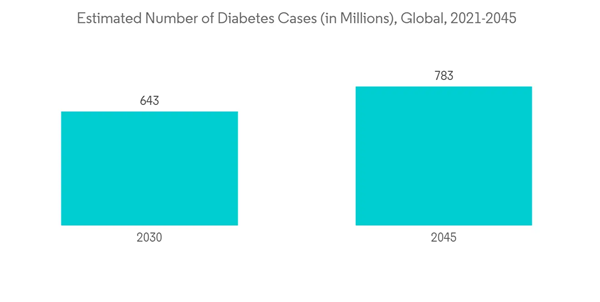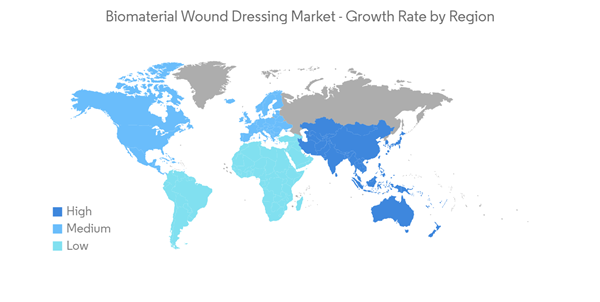The COVID-19 pandemic severely affected the healthcare sector, including the biomaterial wound dressing segment. Moreover, the COVID-19 pandemic affected the global economy and showed a huge impact on the functioning of general hospital care for non-COVID-19 patients in hospitals globally. For instance, according to an article published by the AJMC in September 2021, a significant percentage of patients with chronic wounds had delayed preventative and emergent wound care during the COVID-19 pandemic. Such delays during the COVID-19 pandemic negatively impacted the growth of the studied market. However, with the restrictions being lifted, wound care services have been resumed, which is expected to add to the growth of the biomaterial wound dressing market over the forecast period.
The biomaterial wound dressing market is driven by advancements in technology, a growing ageing population, the rising burden of chronic wounds and problems, and side effects associated with conventional wound healing procedures. Furthermore, an increase in government initiatives, demand for fast and safe treatment for chronic wounds, and an increase in the prevalence of lifestyle disorders such as diabetes leading to venous leg ulcers, pressure ulcers, and diabetic foot ulcers propels the growth of the market. For instance, according to the International Diabetes Federation’s IDF Diabetes Atlas Tenth edition 2021, over 537 million adults in the world were living with diabetes in the year 2021. The source also reported that the number of diabetic people in the world would increase to 643 million by 2030 and 783 million by 2045. The rising number of people affected by diabetes, who are more susceptible to foot ulcers is expected to boost the growth of the studied market.
The expansion of public health programs devoted to wound management is also anticipated to fuel market expansion. During a webinar hosted by the National Wound Care Strategy Programme in May 2022, for instance, presenters discussed a number of different approaches to healing venous leg ulcers. The expansion of the examined market is anticipated to benefit from initiatives aimed at raising public awareness of wound care services.
However, the high cost of treatment and unfavorable reimbursement policies are the few factors that hinder the market growth.
Biomaterial Wound Dressing Market Trends
Alginate Dressing is Anticipated Have Significant Share in the Forecast Period
Alginate dressing refers to light, non-woven natural wound dressings that are composed of highly absorbent materials and promote healing. These are widely used in exudent wounds, where there is excess fluid. Alginate dressing is usually made from seed wood thus, highly absorbent and providing a moist wound environment that is favorable for treating dry injuries.Furthermore, alginate dressing is suitable to treat bleeding wounds and keep nerve endings moist reducing pain. This makes them preferable in treating heavily draining wounds, surgical wounds, first and second-degree burns, and in donor sites, this is likely to fuel the segment growth over the forecast period.
Alginate is widely used in wound healing properties owing to its hydrophilic nature. For instance, according to an article published in the journal of Personalized Medicine in September 2021, alginate is the most common biomaterial with wound-healing properties, when compared to other biomaterials. The alginate wound dressing can take up multiple forms such as beads, blends, dressings, electrospun scaffolds, flexible fibers, films, foams, gels, hydrogels, injections, microparticles, microspheres, nanoparticles, polyelectrolyte complex, powders, ropes, sheets, sponges, and others due to its hydrophilic nature, and are thus used on post-traumatic wounds or exuding wounds. Such wide application of the alginate dressing is expected to boost the growth of the studied segment over the forecast period.
Moreover, the research on the use of alginate dressing for chronic wound healing has also been on the rise in recent years. For example, an article published in F1000Res. in June 2021 indicated that gallic acid-incorporated alginate biofilm could be efficiently used for the treatment of low to medium-suppurating chronic wounds. Thus, the improved research on alginate dressings is expected to propel the growth of the market segment over the forecast period.
North America Expected to have Significant Market Share in the Forecast Period
North America's biomaterial wound dressing market is projected to have a significant market share worldwide. Major factors that are driving the market in the region are a rapidly growing aging population, a high diabetic population, and the developed healthcare system, which adapts to novel innovations.The increasing number of people affected by diabetes is a major factor contributing to the market growth. For instance, according to the National Diabetes Statistics Report updated in January 2022, around 37.3 million people in the United States have diabetes, which equates to around 11.3% of the total population. Also, the report stated that around 96 million people aged 18 years or older in the United States have prediabetes. Moreover, as per the American Diabetes Association Statistics updated in February 2022, about 283,000 people in the United States under the age of 20 are estimated to have been diagnosed with diabetes, approximately 35% of that population.
Also, as per the International Diabetes Federation, in 2021, over 2.9 million people in Canada in the age group of 20-79 years were found to be affected by diabetes. The same source indicated that by 2040, the number of people with diabetes in the nation would rise up to around 3.5 million. The rising diabetic population in the North American region, who are more susceptible to foot ulcers, is expected to increase the demand for innovative wound dressing technologies, which is likely to add to the market growth over the forecast period.
Moreover, the presence of key market players coupled with their activity in the launching of new products and R&D are expected to bolster the market growth in the region.
Biomaterial Wound Dressing Market Competitor Analysis
The biomaterial wound dressing market is moderately fragmented and competitive. The major market players, such as 3M, ConvaTec Group PLC, Mölnlycke Health Care AB, Smith & Nephew PLC, and B. Braun Melsungen AG, hold a significant market share in the industry. Most of the market players are focusing on bringing advanced products in the market to acquire the maximum market share.Additional benefits of purchasing the report:
- The market estimate (ME) sheet in Excel format
- 3 months of analyst support
This product will be delivered within 2 business days.
Table of Contents
Companies Mentioned (Partial List)
A selection of companies mentioned in this report includes, but is not limited to:
- 3M
- ConvaTec Group PLC
- DermaRite Industries LLC
- B. Braun Melsungen AG
- Hollister Incorporated
- Integra LifeSciences Holdings Corporation
- Johnson & Johnson
- Medtronic PLC
- Molnlycke Health Care AB
- Smith & Nephew PLC










